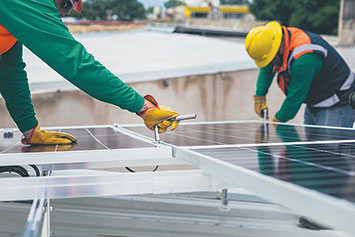 By ELIZABETH DONALD
By ELIZABETH DONALD
Illinois Correspondent
Springfield, IL – Illinois is establishing 13 hubs for “clean jobs” through the Climate and Equitable Jobs Act (CEJA), representing nearly $40 million in funding for training and job placement in clean energy.
The Illinois Clean Jobs Workforce Network Program – or “CEJA Workforce Hubs” – represents the large training component of the CEJA program, funneling $37.9 million into organizations that will run the hubs. Gov. JB Pritzker announced the funding and Hub application period on July 21.
“The CEJA Workforce Hubs are key to the state’s transformative clean energy workforce efforts,’ said Kristin Richards, director of the Illinois Department of Commerce and Economic Opportunity. “With a key focus on equity, the 13 hubs will open up opportunities and serve as critical launchpad to obtain jobs in Illinois’ growing clean energy sector.”
The hubs will be the core of an interconnected set of clean energy workforce development and community support programs. They will provide training and certification in alignment with the Clean Jobs Curriculum Framework to prepare workers for entry-level clean energy jobs, including an introductory training program and at least two job-specific programs in the industry.
Participants attend free of charge, receive a stipend and access support services. The certifications are nationally recognized and should provide paths to long-term careers in renewable energy, electrification and energy efficiency industries. The educational and career counseling as well as hands-on learning is intended to reinforce the classroom-taught skills.
GOAL TO ENROLL 1,500 IN FIRST YEAR
The program’s goal is to enroll 1,500 students in the first year, increasing capacity over the course of the program.
“It’s been our priority since day one that as Illinois moves into the clean energy future, we make sure to continue to build strong career paths for those breaking into this growing industry,” Pritzker said. “Investing in these workforce hubs is a cornerstone of that commitment, working in collaboration with educational institutions and businesses to build on our successes as we move toward a greener and more equitable state.”
The program also will be supported by Barrier Reduction Program funding, which helps participants with transportation, child care, supplies and other costs that often prevent low-income and underrepresented populations from accessing these inds of programs.
“When we provide an individual with training and credentials, we are not just giving them one tool for their next job,” said state Rep. Jay Hoffman (D-Swansea). “We are setting them on a course for their entire career so they can be competitive in the modern workforce. I look forward to seeing many more union journeymen and journeywomen working on clean energy infrastructure because of today’s announcement.”
Lt. Gov. Juliana Stratton said the program is a testament to the administration’s commitment to building a greener tomorrow.
“These community-based hubs will remove barriers to economic opportunities and ensure that our communities have the tools and training for the jobs of tomorrow, as Illinois continues to lead the way in innovative, sustainable industries,” she said.
APPLICATIONS THROUGH SEPT. 1
Applications from qualified community-based providers will be accepted through Sept. 1. Qualified providers might include nonprofits, community college and local governments that provide employment skills and training services. At least one grantee will administer the program in each of 13 hub locations defined in the statue, which include Alton, East St. Louis and Carbondale.
This program follows the Climate Works Pre-Apprenticeship Program, which closed applications on July 20, and the Energy Transition Navigators Program, which is taking applications through Aug. 15.
CEJA is a 29-year plan to transition Illinois and its workforce to 100 percent clean energy sources, adding regulations to fossil fuel companies and major incentives for electric vehicle and solar energy companies. It is predicted that the plan will save billions in energy costs in the future – one study estimated that getting to 40 percent renewable energy by 2030 would lower costs by $1.2 billion, according to the Illinois Investment Guide of 2022. CEJA includes 15 workforce and community investment programs as well as extra funding for existing programs.


